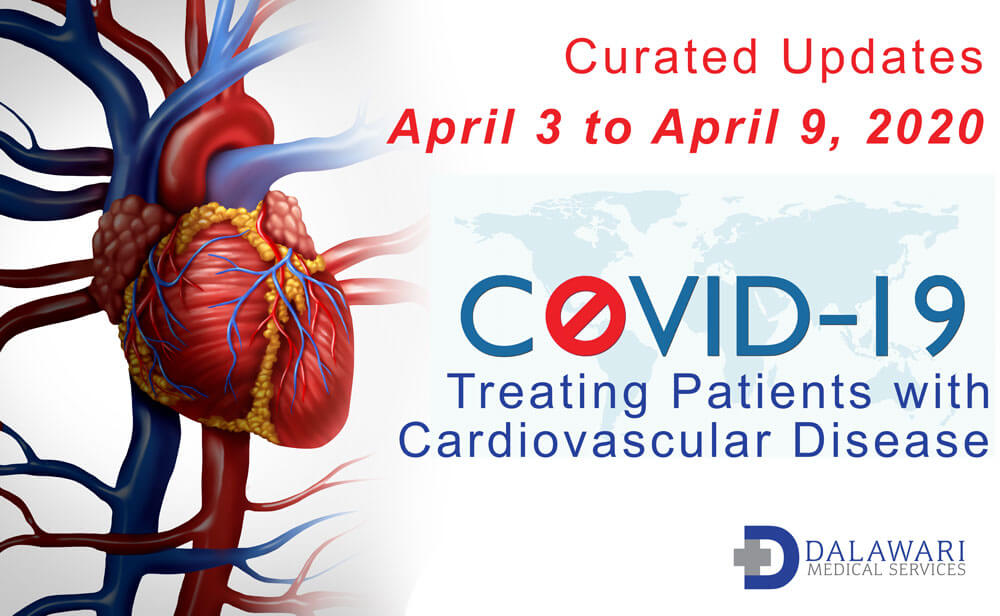COVID-19 & CARDIOLOGY UPDATES: April 03 to April 09, 2020

In response to the COVID-19/Coronavirus outbreak as it relates to treating patients with cardiovascular disease, many medical associations and organizations have released statements specifically related to treatment for cardiovascular patients.
As we have little to no clinical data at this time, position statements and articles from reliable sources are especially important.
These resources provide credible and trustworthy information. Many if not most, speak to the need for more detailed research and data, to help guide us as we develop new standards of practice to ensure optimal care based on clinical practice rather than speculation.
COVID-19 STEMI Registry Created to Study Acute Cardiovascular Effects of the Virus
The Society for Cardiovascular Angiography and Interventions (SCAI) and the Canadian Association of Interventional Cardiology (CAIC) announced the formation of the North American COVID-19 ST-Segment Elevation Myocardial Infarction Registry (NACMI). This will record data on novel coronavirus (COVID-19, SARS-CoV-2) patients who have STEMI. The purpose of the trial is to quickly gather information to understand the adverse cardiovascular effects being seen in COVID-19 patients.
"We believe that this registry has the potential to provide critically important time-sensitive data to inform the management and treatment guidelines applicable to COVID-19 patients," SCAI said in a statement on the study.
Any COVID-19 positive patients or persons under investigation (PUI) with ST-segment elevation or new-onset left bundle branch block (LBBB) with a clinical correlate of myocardial ischemia (including chest pain, dyspnea, cardiac arrest, hemodynamic instability) will be in enrolled.
The data will be compared to an age and gender-matched control population from the existing Midwest STEMI Consortium, which is a large (>15,000), prospective multi-center registry of consecutive STEMI patients.
FDA Approves ECMO to Treat COVID-19 Patients
The U.S. Food and Drug Administration (FDA) has issued guidance to provide a policy to help expand the availability of devices used in extracorporeal membrane oxygenation (ECMO) therapy to address the novel coronavirus (COVID-19, SARS-CoV-2) public health emergency.
ECMO systems are used for long-term respiratory/cardiopulmonary failure and provide assisted extracorporeal circulation and physiologic gas exchange of the patient’s blood for more than six hours. The technology can oxygenate a severely sick COVID-19 pneumonia patient's blood without the need to transfer the oxygen through fluid-filled lungs.
As a sudden acute respiratory syndrome, COVID-19 can trigger acute respiratory failure and/or acute cardiopulmonary failure. Under these conditions, the FDA states in the new policy extracorporeal oxygenation can now be used for greater than six hours as tool for treating patients. The FDA said it recognizes the importance and utility of increased availability of ECMO devices for patients during the COVID-19 emergency.
Joint Statement Issued on Reducing Arrhythmia Risk With COVID-19 Repurposed Drugs
Do you have questions about a medical case or need help understanding treatment plans and options?
Health & Patient Advocacy | Medical Case Review
Medical Expert Witness
Dalawari Medical Services - Medical Consulting
Click here to Contact Us via email or Call + (804)-991-4109
Do you have questions about a medical case or need help understanding treatment plans and options?
Health & Patient Advocacy | Medical Case Review
Medical Expert Witness
Dalawari Medical Services - Medical Consulting
Click here to Contact Us via email or Call + (804)-991-4109
Do you have questions about a medical case or need help understanding treatment plans and options?
Health & Patient Advocacy | Medical Case Review
Medical Expert Witness
Dalawari Medical Services - Medical Consulting
Click here to Contact Us via email or Call + (804)-991-4109



